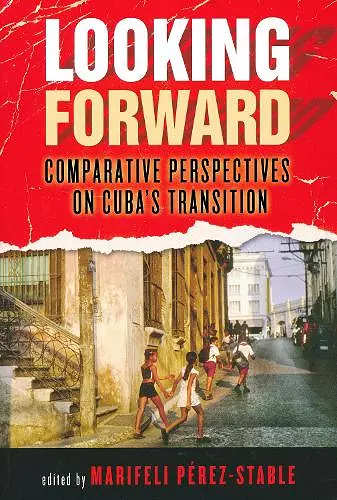Looking Forward
Comparative Perspectives on Cuba's Transition
Format:Paperback
Publisher:University of Notre Dame Press
Published:1st Sep '07
Currently unavailable, and unfortunately no date known when it will be back

In Looking Forward, Marifeli Perez-Stable and her colleagues imagine Cuba's future after the "poof moment"—Jorge I. Domínguez's vivid phrase—when the current regime will no longer exist. Written in an accessible style that will appeal to all interested readers, this volume does not try to predict how and when the Castro regime will end, but instead considers the possible consequences of change. Each chapter—prepared by an expert in the field—takes up a basic issue: politics, the military, the legal system, civil society, gender, race, economic transition strategies, social policy and social welfare, corruption, the diaspora, memory, ideology and culture, and U.S.-Cuba relations.
The author of each chapter considers three questions: How have other new democracies handled the basic issue in question? How might Cuba's unique conditions affect this area in transition? What are the likely outcomes and alternatives for a Cuba in transition? Designed with students, policy-makers, and journalists in mind, this lively and accessible volume is an essential resource.
"When Fidel Castro is gone, Cuba will change. Whether change is peaceful or violent —or for good or ill—willl depend on whether we take the lessons offered in Perez-Stable´s collection of essays from the very best experts on Cuba. If there is to be a happy ending, then Looking Forward offers the best map yet on how to get there." —Ambassador (retired) Vicki J. Huddleston, former Principal Officer of the United States Interests Section in Havana, Cuba 1999–2002
"There are few if any serious, balanced, and comprehensive appraisals of the various futures open to Cuba upon the death of Fidel Castro. For those interested in these matters, this book is a treasure trove of data, analysis, and innovative thinking about Cuba's precarious future. Its originality lies first in the fact that each chapter offers detailed descriptions of processes and lessons from other Latin American and socialist contexts that shed light on what is likely to happen in Cuba. At the same time, these chapters manage to give credit to the unique and exceptional nature of Cuban history, nationalism, and socialism so that lessons are not applied blindly with no eye to their applicability in the Cuban context." —Ted Henken, Baruch College
"This is the most important book about Cuba to appear in a generation. A group of 'not-your-usual-émigrés' and other experts who have taught us most of what we already know about contemporary Cuba have performed an extraordinary service to the policy and academic communities—and their patria—in imagining Cuba's future after Fidel. Building on their diverse expertise in politics, economic reform, civil-military relations, social policy, race, gender, and cultural relations, and drawing from models around the world of regime transitions gone wrong and right, their compelling essays project Cuba's recent past onto its immediate future and lay a blueprint for a free, democratic, and just society. There is quite simply no book like it." —Frances Hagopian, Michael Grace II Associate Professor of Latin American Studies, Kellogg Institute for International Studies, University of Notre Dame
"The essays are surprisingly far from theoretical but essentially practical and highly accessible. Early in the revolution, Castro liked to say that Cuba represented socialism with a human face. Well, that is so with the essays in this volume. Whatever happens to the island, this book will serve as a guide to readers trying to understand social developments and political transformation in post-Castro Cuba." —Multicultural Review
"This book focuses on what the authors believe to be the inevitable transition to a democratic regime in Cuba after Fidel and places their estimates of what that transition might be in a comparative framework, making particular reference to the transitions to democracy in Latin America and to the transitions from authoritarian socialist regimes in Eastern Europe, China, and Vietnam. All in all this is an excellent collection and it should be on the reading list of anyone interested in Cuba." —The Americas
"Perez-Stable presents 12 essays that explore the possible paths of a post-Castro Cuba with reference to the extent literature on democratic transition. . . . The topics addressed include political institutions, civil-military relations, constitutional change, civil society, gender equality, race and cultural politics, economic transition, social policy and social welfare, corruption, the émigré community, ideology and memory, and relations with the United States." —Research Book News
"Writings that speculate on Cuba's economic, political, and social transition after Fidel Castro's death." —The Chronicle of Higher Education
"Contributing experts address particular issues, which include politics, the military, the legal system, civil society, gender, race, economic transition strategies, social policy/social welfare, corruption, the diaspora, memory, ideology and culture, and relations between the United States and Cuba." —Hispanic Link Weekly Report
"Informed by the experiences of socialist transitions in eastern Europe and East Asia, leading experts on Cuba offer stimulating speculations on post-Castro scenarios . . . [and] includes a number of outstanding chapters. Carmelo Mesa-Lago suggests plausible ways that a post-Castro Cuba could achieve greater economic efficiency without sacrificing social equity, and Daniel Erikson offers striking insights on how to escape the corruption curse. And the always eloquent William LeoGrande provocatively suggests that Miami's hard-line Cuba lobby may prove to be a paper tiger when the moment for normalization finally arrives." —Foreign Affairs
"This is a collection of articles on post-Castro Cuba that ranges from classical transition studies . . . to issues closer to the microphysics of power. . . . All of these are essential to understanding a regime that made a vast symbolic investment to consolidate its power." —Abstracts of Public Administration, Development, and Environment
ISBN: 9780268038915
Dimensions: 229mm x 152mm x 20mm
Weight: 521g
354 pages